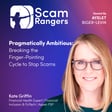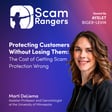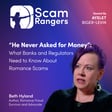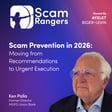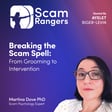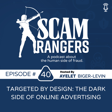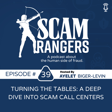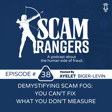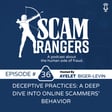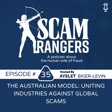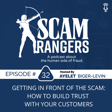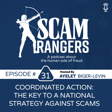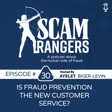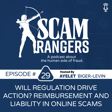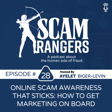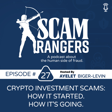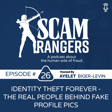Engaging Customers with Social Psychology and Storytelling
00:00:00
Speaker
With authorized push payments, we we quickly saw you know it doesn't work that way. Criminals don't work that way. When we looked into the cases, how criminals worked, like with their social engineering skills, you know their masters of social psychology, we just thought we should do the same. We should do use that same trick they're using so to get into your and the emotion of our customers. And you don't do that with like instrumental communication.
00:00:29
Speaker
But we click quickly came in and we used Daniel's Panama's theory basically for that to get to the emotion of our customers. And what better to tell stories? That's how our ancestors did it. You know, when there was still no internet, no TV, no newspapers even, how did you spread the word that was by telling stories? Because stories have emotion, they stick They also do say when it comes to fraud or security, they you know they're willing to have some friction if it's explained correctly. If they know why, then they accept it. And and you know that that was also like the big mind shift for us. So that's why we you know we could introduce ah tools for customers themselves to prevent themselves.
00:01:20
Speaker
Scam Rangers. a podcast about the human side of fraud and the people who are on a mission to protect us. I'm your host, Ayere Figuero Levine, and I'm passionate about driving awareness and solving this problem.
Daniel Kahneman's Thinking Systems
00:01:37
Speaker
Daniel Kahneman, a Nobel Prize-winning psychologist, researched human decision-making in his book, Thinking, Fast and Slow. He explained how we rely on two systems of thinking. System one is the emotion-driven, fast, and intuitive. And system two is the slow and logical, rational thinking. Though we like to think that we're rational, system one's automatic responses often drive our decisions influenced by cognitive biases.
00:02:04
Speaker
Stories play a powerful role by engaging System One, making information stickier and more influential than raw data.
Meet Niels Vink and Katalina Swack from AB&M World Bank
00:02:12
Speaker
Our guests today come from AB&M World Bank in the Netherlands. I'm so glad to host Niels Vink, Manager of Fraud Monitoring, and Katalina Swack, Expert Lean in a Fraud Chain on the Seastal, to share how they've harnessed this research to protect their customers from online scams by turning these insights into actionable strategies and powerful storytelling.
00:02:36
Speaker
so Hi, both of you. Welcome to the podcast. Thank you so much. Good afternoon. I was really looking forward to this conversation. We've mostly had people from the US on this podcast, but I'm so excited to share the perspective from Europe and in particular from the Netherlands, from both of you.
00:02:55
Speaker
So let's ah dive right in before we actually dive right in. I wanted to ask you if you can tell me about yourself, how you got into fraud, ah what your role is with AB and EMRO, and I would love to start with you Katalina.
Katalina Swack's Career in Fraud Prevention
00:03:09
Speaker
I'm working in the financial industry for over 25 years at the moment, but only three years of fraud. Before all that, I studied history and economics.
00:03:19
Speaker
And I wanted to learn more, so that's why I applied within a bank because there was a whole greenfield for me. So I traveled across all different departments. I've worked in branches as an employee, but also as a brand manager. I've worked in product management and marketing. I worked in the COO office, digital banking, and finally took the leap into the black box of the corporate information security office for fraud to be that bridge between like IT and our customers. And that took me here and I met Nils.
Niels Vink's Journey from Criminology to Fraud Monitoring
00:03:55
Speaker
Yeah, I've been working in in fraud since I think 2010. I have a criminology background. So when I started off with my career, it was as a collections agency. And with that background, I could start at a credit card company, which is now a daughter company of AB and MRO. And from that point,
00:04:18
Speaker
ah don' worry So I've started at an operation, fraud operations department, calling customers, also having a lot of conversations with fraudsters actually. And climb I climbed my way up to management positions, also been in positions of where I was responsible for AML, KYC, but fighting fraud appealed more to me. So I took the step towards AB and Emerald a couple of years ago. I think it was three years ago.
00:04:47
Speaker
And I'm now a manager of the fraud monitoring department. On a day-to-day basis, I'm responsible for a team of 20 people creating models and rules to detect debt fraud and prevent our customers from being victimized. And I'm his counterpart. I lead a team of which basically is called the fraud chain, which also like instigates what I'm doing within AB&M role. Of course, I lead the fraud chain within general security.
00:05:15
Speaker
but also the whole fraud chain within AV and Emerald. So I'm working like bank wise actually. Also for one mission to protect our customers from fraud in any way.
00:05:27
Speaker
I think your backgrounds are really fascinating, both the criminology and the history and economics and what you bring to this role.
The Role of Diverse Backgrounds in Combating Fraud
00:05:33
Speaker
And thats I think that's very unique from banging professionals that I talked to that many of them start actually from the branch and and find their way up and stumble into fraud. But you bring that that perspective of of you know the broader perspective and the psychological perspective as well. And especially when we're dealing with criminals who are now manipulating individuals. And that I think that really comes in handy with combating it. So we'll talk about that. So I wanted to ask you, I think most of the conversation that we had on the podcast have been focused on the US. I really wanted to ask you if you can tell me how you think things are different between the US and Europe when it comes to the whole ecosystem, not just scams, but even the banking ecosystem and the cultural ecosystem.
Comparing US and Netherlands Banking Cultures
00:06:22
Speaker
um you know And indeed, we like you said, the cultural part of the whole ecosystem, I think in the Netherlands, you know we have great emphasis on on basically the collective responsibility and the trust and in institutions like our governments, police, banks as well. So we're a high trust society and then also makes apart from the regulations we have in Europe, um but also in the Netherlands, we have as banks, we have a duty of care.
00:06:48
Speaker
to our customers, which extends pretty far also in the world of fraud and scams, as it comes to basically protecting our customers from fraud, spreading awareness on fraud, because, you know, they rely on us for that matter. And then use, I think, yeah, yeah yeah for payments. What Kathleen is saying is also based in in laws and regulations here. So it's also formalized in Europe and in the Netherlands.
00:07:15
Speaker
But also if we look at, there's some difference also in the payment infrastructure where the United States is a mostly credit card driven country. We are a a debit country, which is also quite quite different. We have different payment products, not necessarily MasterCard and Visa, but also a thing called ideal, which is a Dutch product. And we have been, for example, we also don't have checks anymore, so check fraud as a complete non-existing fraud in in the Netherlands anymore. But also looking, for example, to instant payments, which has been around also for quite some time, which makes the way of and intervening with fraud. We need to do that quite fast because the the money is gone quite fast as well. so And the thing with inter-European instant payments infrastructure
00:08:09
Speaker
provides us also with the need to act swiftly across Europe. So yeah, we've we've been dealing with it for quite some time. Instant payments have been in the in Europe for lot much longer than in the US. Zelle was rolled out a few years ago in the US. So it's and it's a form of instant payments. It's supposed to be P2P, definitely used by scammers a lot. Do you see a difference between Zelle and other instant payments that you roll out in terms of the sense of urgency and you know and putting controls around it?
Impact of Instant Payments on Fraud Detection
00:08:43
Speaker
Well, as I understood it, but
00:08:46
Speaker
Correct me if I'm wrong, is that that cell is is actually an option. We don't have to use it where, where yeah especially in the Netherlands, all payments are instant, full stop. yeah So it's not an option, it's just, it's instant. It's it's there. Yeah, it's how it works. It's an important clarification.
00:09:08
Speaker
Yeah, and especially in the Netherlands, because in the rest and it's not and the Nordic countries, they also have instant payments and now it's it's gradually spreading across Europe. Yeah. And I think also one thing to emphasize a bit is ah strong customer authentication, which has been around also for quite some time, also regulated. So it's it's mandatory for us, at least since PSD2 came effective. And that's created a large shift as well ah from a non-authorised payment fraud scheme to the authorised push payment fraud, um which is the main concern currently. but we We will touch upon that later.
00:09:54
Speaker
Just to maybe tell our listeners, so PSD2, strong customer authentication mandates, multi-factor authentication that is well defined in the regulation for all transactions with only exceptions that are built on trust and reputation, which means that there is no password stealing that allows payment. It's always going to be multi-factor authentication.
00:10:17
Speaker
So it's harder to commit a county over fraud and therefore a lot of the fraud is around authorized payments where essentially it's a scam where someone is manipulated to transfer money to the criminal.
00:10:30
Speaker
So we'll talk about that later a little more. But tell me about the situation with online scams in the Netherlands from your perspective. Over the last few years, how has it evolved? I'm sure it touches on the point we just discussed. But what are the trends you've been seeing?
COVID-19 and the Rise of Push Payment Scams
00:10:43
Speaker
What were customers mostly contacting you about? To get back on the on the point before and what what we have been really effective in the last couple of years is we gained control of the non-authorized payments.
00:10:58
Speaker
leveraging the strong customer authentication at least two out of three. So you are something you have or something you know. That combination was was key to really ban out the non-authorized payment frauds. What you see, and this is ah of course a logical effect of that of that success, is that frauds need to keep the money flowing. So they will look for new opportunities and What's the next point they can hit is not the bank in itself as the bank being not not safe, but ah the customer who holds that key to the vault. What you now see is that the customer is approached to do the the transaction themselves, they basically called authorized push payment. It comes in all different forms, which is harder to detect in general because it's the customer making that transaction themselves.
00:11:58
Speaker
So yeah, that's that's the biggest biggest challenge currently for us. Yeah, what you also see, you know, digital banking really, you know, creates a shift. We hardly, as AB&M, we hardly have any physical branches left or fully digital. um and And that's also is a huge different from actually taking your money to the bank where we put it in a vault and you know, we we make sure your money is safe and secure. We're now making sure that our digital processes are earth safe and secure to use.
00:12:28
Speaker
but we don't own that key to the fold anymore. The customer has that key and and that's a big, in a way, a liability shift. So we're not the sole responsible to save her the money. Customer is indeed himself in charge, but, you know, do they realize it? Are they fully responsible or not? All those questions, you know, come up with that that fully digitization of your financial processes. And then COVID hit and it actually, you know, that was a spike.
00:12:58
Speaker
because we were all at home. A celebration of digital, yeah. and Exactly. So, yeah, you know, we're fully reliant on everything that happened online, and luckily we could bank online. Hey, the scammers knew that as well. So, you know, the pandemic is behind us. But the scandemic that, you know, was spiked by COVID, it's still here.
00:13:22
Speaker
So with authorized push payments, you know that's a big challenge. So I'll get into regulation and and liability in just a
Convincing Customers About Scams
00:13:30
Speaker
second. But before that, I wanted to ask, what are your what are you hearing from your customers about ah you know being hit by scams when they call in? Do they call into the call center? Do they reach out to you? Do they ask for reimbursements? What are you hearing from them?
00:13:46
Speaker
um well most of her If our customers fail victim of fraud, hopefully we call them first um because our detection system did their work. you know Whenever we detect fraud, we send an alert to our operations department and they actually proactively call the customer to you know to ask, hey, you know what's going on? Is this really you? Do you really want to do this payment? There are all sorts of questions, but it can also of course be that they call us ourselves. And ah regardless which way,
00:14:19
Speaker
we have them on the telephone is that they say, is this really you? i I'm not sure who is who is this really my bank I'm talking to. I'm confused. Yeah.
00:14:30
Speaker
because that's like because of the impersonation scams. Exactly, yeah. And you said if you that you detect, so obviously when it comes to account takeover fraud, you have good controls and systems and you're able to detect, but detecting authorized payments where it is the individual and they have passed all forms of multi-factor authentication and the device is their device and the location is fine. How do you detect scams in that situation? but Back in the days when it was only unauthorized payments, it was quite quite easy like So there's a lot of technical options to detect fraud not performed by the customer itself. But when it comes to authorized push payments, it's the customer itself performing the transaction. So you cannot get away with only leveraging technical solutions. You also need to look at what's normal behavior for that customer. And of course, there are a lot of vendors in the market who provide
00:15:28
Speaker
a lot of technical solutions to this challenge. um But it's not only the technical part anymore, you also need to really take that next step in customer awareness. And the customer now had whole not only holds the key to the fault, but also is the key to success in preventing fraud.
00:15:51
Speaker
So ah I have one last question and the poking in the in the customer communication. When you are able to detect that this is likely a scam? So some examples that I don't know are you know new payee, active call while they're in a session, things like that. Those are known technology and and analytical solutions. And you call that customer, and they are being scammed.
00:16:18
Speaker
How successful are you in convincing them? Because you mentioned that they're not sure it's the bank. And is it is it is it a challenge for you to convince them that they're being scammed? A tremendous challenge, which which needs like training almost every day in in sharing each case and telling you know what's been going on and how the scammers work. Because, of course, they change their modus operandi, basically, like every day.
00:16:46
Speaker
um And you need to be creative in those questions because the customers are being pressured. um Sometimes if you listen carefully during such a conversation, you hear papers like right um moving on their desk. like they have They have actually a script in front of them, which they got from the scammers. Now, how do you act on that?
00:17:10
Speaker
So um it it really stands out in in thinking along. They might say, no, I need new solar power system. So I need money for that because it's a costly manner. And you could think, yeah, well, that's correct. Those are very costly to to buy. OK, so then your booking is probably correct. But if you really take some extra time and look into our system, you see that the customer lives in an apartment.
00:17:39
Speaker
So he doesn't need to buy, but ah you know, you learn by telling about these cases every day to each other because they're clever. But I think it's also, it's time. It's time. A customer in order to to be, uh, receptible for, uh, for all kinds of awareness, it's all about time.
00:18:06
Speaker
If the timing is not right, you can talk to the customer for ages. He won't listen. He's already completely in that funnel yeah of the faults provided to the customer that's scripted. So I know for a fact that one one of the one of the banks is also experimenting with ah one of these more in-time or just in-time ah awareness campaigns.
00:18:35
Speaker
Why they also look at another way of getting through to that cost? Because you can say you are being scammed, you are being scammed, you are being scammed. It doesn't resonate.
00:18:48
Speaker
narrative if you If you ask different questions, for example, like but how are you going to pay the rent at the end of the month when you already transferred 95% of your total income of this month to whatever parking And that's where customers also start thinking. and it did So there there are also from a more psychological and perspective, there are experiments within the Dutch market being performed by other banks well ah to to look at at different options to get through to customers.
00:19:21
Speaker
Because they're already in under emotional manipulation, so they won't they won't take it as face value um with the scam. So I think that's a really interesting avenue.
Upcoming UK Fraud Reimbursement Regulation
00:19:33
Speaker
But ah we're here to talk about what you have been doing to actually get in front of the emotional manipulation before the emotional manipulation happens. so I wanted to get to that one moment before I did want to spend some time about on regulation because here in the US we have reg E. Reg E focuses on unauthorized payments and the whole liability around unauthorized payments.
00:19:58
Speaker
um with with some clarifications that have in a few a few years ago they issued clarifications around otp, vishing and how our social engineering of otp is also included under reggie but it's still a account takeover front authorized payments are not covered under reggie.
00:20:16
Speaker
I wanted to ask you, we know that in the UK there's a new regulation that's coming in October this year, I believe, unless it's delayed for institutions to reimburse customers, even for authorized payments in in most cases. What is happening in in the Netherlands and Europe in general from that perspective?
European Discussions on Fraud Reimbursement
00:20:36
Speaker
It's currently under negotiation. but There's a lot of different different views on that. But where what you do see in the UK, of course, is what a lot of people see as a scenario that goes really far. Within the Netherlands in in the past couple of years on the PSD2 with our code of leniency, especially in the Netherlands, which is a Dutch approach, we think it it grows it goes really, really far. It's in the discussion where whether we should reimburse the impersonation fraud from where the bank is and is impersonated to a complete broader sense of the word. Part of that that
00:21:15
Speaker
discussion and part of the idea is also, OK, until where are you going to reimburse and where is that responsibility for the customer itself? Because if you reimburse everything and what what's what own responsibility is there and and won't the fraud go up in general in total. So that's also part, of course, of the discussion. So from from from Europe, we're also really looking What's what's happening across the UK? And there's a new and we're just talking psd2 psd3 is in the making in Brussels. So New York in the government, you know, they're they're talking about it There's a lot of lobbying of all banks in Europe in Brussels right now So we expect end of this year that you know, there there might be some clarity on on you know, how it's gonna look
00:22:11
Speaker
um if we zoom in on in the Netherlands, of course, we have to deal with the PC too, but um When we saw authorized push payment coming up and then especially impersonation bank entry So where fraud star misuses like the trust people have in banks So as soon as you know, you get a phone call from AB and emerald in our case, you know You have to trust that it is your bank who is calling you. So in those cases um We have like this duty of care amongst all major banks. We decided, okay, we we are going to reimburse those cases, you know, where our name is being misused because our trust, the trust that people have in the financial system is being misused and you know, we don't want that. So those cases we do reimburse in the Netherlands.
00:23:08
Speaker
Yeah, that's that's really interesting. um An interesting point, that that angle of trust. How do we maintain trust in, I think, broader sense in the digital world? Because if if someone gets a scam message almost every day in a scam call, um it's just like noise all around there. and And people are starting to generally lose trust in digital communication.
00:23:34
Speaker
And if if we businesses are online and everything today is online, how do we restore that trust? um How do we
Maintaining Customer Trust in Digital Communications
00:23:42
Speaker
maintain it? And how do we not have people just you know minimize the communication? So um I think not the reimbursement in particular, but but just that care and and attention to our customers' trust is being eroded here. How do we tackle that? I think that's an important point to consider.
00:24:02
Speaker
be it reimbursement, be it something else, but that's and a really, really important point. Yeah, I think yeah you had a really good point. It's not solely reimbursements. I mean, that's part of the pain, of course, ah when you get your money back. But, you know, um along with that, banks also ah together in the in the Dutch Banking Association, but also individually, and especially AD&M,
00:24:26
Speaker
Now we also started awareness campaign on those topics actually to create awareness amongst our customers and their society as a whole. It's not us. This is how fraudsters work. This is what they do. This is how it looks like. um We would never ask this from you. um So we're, you know, we started to advocate that on a broad spectrum to our customers.
00:24:53
Speaker
So actually that's a great segue to the main topic of conversation today. So what approach realistically did you take to help your customers be proactive in, I think a a big part of that is education. So can you share what you did?
AB&M's Fraud Awareness Campaign with Real Stories
00:25:09
Speaker
And maybe yeah it's good to take one step back, taking us back to somewhere in the beginning of of the 2000s, 2005, 2010-ish, where it was also not really, um,
00:25:21
Speaker
standard procedure to to raise awareness from a banking perspective towards our customers. So something changed in in the last decades. We got used to to and providing our customers with the information they need to make that that call themselves. I think this is where I got the line again. And notice too, because you know previously with non-authorized payment frauds, You know, then the customer can sense, okay, but you know, thank your, your systems and your processes are not safe. Now with authorized push payments, it's fair, you know, our systems are safe and you know, a customer is being misused as being misled. And so our customers are at stake. If you don't have to deal with fraud, because luckily, you know, the numbers are huge, but if you take it to the whole population,
00:26:12
Speaker
If you don't have to do anything with fraud or you've never heard of it, you're not really so subtle for the message. You might ignore it. So once we started communicating, don't do this, don't do that. You might hear that message and you think, know that that I know that. And you go on with whatever you were doing. With authorized push payments, we we quickly saw, you know, it doesn't work that way. Criminals don't work that way. When we looked into the cases, how criminals worked ah Like with their social engineering skills, you know their masters of social psychology, we just thought we should do the same. We should do use that same trick they're using um so to get into europe and the emotion of our customers. And you don't do that with like instrumental communication. So we really spent quite some budget and efforts into research. you know How can we do that? Of course, we're still a bank. so you know we have to
00:27:12
Speaker
have a certain way in which we do we our our commercials. um um But we click quickly came in and we used Daniel's Panama's theory basically for that to get to the emotion of our customers and what better to tell stories. That's how our ancestors did it. You know, when there was still no internet, no TV, no newspapers, even how did you spread the word that was by telling stories? Because stories have emotion, they stick to And that that was basically our first new campaign on fraud and safe banking was fraud stories from our own customers who felt victim of fraud, who told their story. Um, for one to break the taboo because victims of authorized push payments often, you know, that they feel stupid. Um, also because people tell them that because if they, you know, are open about this, how can you do that? How can you fall for that? You know, it's not true.
00:28:11
Speaker
Yeah, but for them it really was real and they fell for it. So they felt stupid. So we broke the taboo and we actually found customers willing you know to tell about what happens, to tell their story. And and you know that that really struck our customers. It struck the media. So we got a lot of media attention also on that part to spread the words. And that that was really nice.
00:28:38
Speaker
And, you know, that that was basically the first step in doing something completely different in that in our awareness. I think that's a really, really unique approach in telling stories. I've seen um banks in the UK kind of doing funny commercials, so kind of social engineering people with trip magic tricks and then telling them
Storytelling's Impact on Fraud Awareness
00:29:01
Speaker
be careful. But I think telling a story when something in the moment happens it It reminds you of something that you heard already and that can really make that connection. So I think the ah the effectiveness of that is is definitely going to be higher. It was. You can you can compare it a bit with riding a bicycle and you can make a commercial about awareness, ah telling your customers just don't don't fall. But if you don't tell them how not to fall, and to pay attention for those rocks in the road,
00:29:36
Speaker
They will never know, so you really need to take them along, tell that story of someone riding a bicycle who actually fell because of a rock in the road. It creates a lot more attention and it resonates a lot better than just telling, just don't fall down.
00:29:54
Speaker
yeah yeah I think one thing that is amazing is how you know the the fact that you are able to get real victims to speak up and share their stories. So tell me a little bit about that. How were they you know willing to do that and what was the
Engaging Victims to Share Stories for Prevention
00:30:11
Speaker
reaction? i I'm asking in particular because just a few days ago someone published a um and case where she shared she was victim of a romance scam and she got so many negative comments and it was just painful because we all know that this can happen to anyone and it just they need this the criminals need to find the right hook for it but there's something for you can always say how how were you able to fall for this because because i'm a human being and i have emotions and you know everyone has their weakness point and it's not weakness it's human but how
00:30:49
Speaker
How were people kind of, how were they willing to step up? And how did you manage the reactions to the stories too? Well, I think partly because, you know, within AV and Emerald, we worked like in the 4chan, like I mentioned. So we closely collaborate with our colleagues from fraud operations who are in touch with the customer. And they also really felt backed up by by the rest of the organization, which makes that, you know, their their net promoter score, which which is something thing in call centers everywhere around the world. It's somewhere between a plus 40 or 50, which is extremely high. So customers, although they felt victim of fraud, which is a really, you know, nasty, emotional thing to go through, um they felt hurt. They, you know, they got sympathy on the phone. You know, those are really, they've really felt like a warm up and really, you know, satisfaction in how we deal with them.
00:31:46
Speaker
um So that made it easier to go back to those customers and explain to them, hey, you know we really think your story, you know it's a real story and it needs to go out there and you can help you know other customers, other people to prevent falling into those scams if we share those stories. So that's how we got people and and you know not everybody we called wanted to participate because it's also meant like taking your picture and your story, not your name, but you know, you're out there, and which is also kind of thing, you know, you're out there in the whole of the Netherlands, you have you need to be willing to do so. um But yeah, that made it a little bit easier for us at least to contact them because you know, they they're they're really happy on how we dealt with their products. Thank you for sharing that. I think that's really going to be helpful for other financial institutions who
00:32:39
Speaker
would want to do the
Defining Success in Fraud Awareness Campaigns
00:32:40
Speaker
same. So how did you define success? You mentioned that you did research and you spent money and this whole campaign. How did you define success and was it successful in your terms? he You can define success ah in a lot of different ways. You know, internally for my team and the whole fourth chain, basically at first was like closely collaborating together because, you know, in a big organization like a bank, that's always hard and everybody Um, of course has their own stakes because we also work closely together with e-commerce. They're very commercial part of our bank, which they should be. Um, but they have to send our emails from our campaigns as well. Um, we got it who need to make certain solutions and tools that our customers can use to keep them safe. So, um, our first goal was, you know, to get that chain, uh, closely collaborating together.
00:33:35
Speaker
were in here for our customers to convince everybody in their chain to to work like that. So that was basically the first success we had. and you know it was We were in crisis mode um because of malware infections we saw with our customers. So we needed to convince our e-commerce partners, we need to take action now. So basically,
00:34:00
Speaker
Catalina from the fourth department was asking a commercial department, you know, drop everything and please make a customer aware of this attack. Um, it's not a commercial message. We didn't lose any money at that point. We never lost any money. None of our customers, you know, lost money in that attack, which I'm very proud of. Um, and I needed to convince them. Uh, and the easiest way on, on which on how I could explain more, which is kind of you know, quite technical if you really want to discuss or dictate, you know, how it works. That's not the point, but it's on their mobile phone. And I don't know about you, but my whole life is in there. You know, my family pictures, all my music, and you know, all my favorite games, my newspapers, everything is on there. And once it's infected, it's gone. You don't want the customers to listen. Do you want to lose? And they were like, no, okay, we get it.
00:34:57
Speaker
So within 24 hours, we got that notification out to our customers and they responded really good to that. Oh, thank you. Thank you for notifying. That gave a good MPS and that's for, for every department, whether you're commercial or not, you know, that's why you do it to have those happy customers. um So that, you know, was our first, you know, internal definition of success. We're now actually could say we all, you know, collaborate closely together in this.
00:35:24
Speaker
Now, once you look to certain KPIs, which you know everybody has for campaigns, like your customer satisfaction on a campaign, if you measure it on a scale from one to 10, our latest fraud campaigns scored 9.8 with our customers. Wow. Out of 10. Wow. 9.8. Yes. So that's what everybody wants. And that's not a number.
00:35:51
Speaker
you know, regular commercial companies. So how do you translate that to a metric of customer trust? That's really hard to say. We have customer satisfactory, you know, investigations every year. And they're, you know, they do stipulate that they're most happy with the the fraud and security messages they get, because it's also on top of their minds. You know, it's all over the news in the Netherlands. If there was like certain frauds or ransomware attacks, they like to know what's going on. in they And you know, they like to have messages from their bank, how to stay safe. So that's really funny. I think that's the best example. Also, customers expected nowday nowadays from banks, if you do not communicate about fraud, if you do not communicate about safety, security, anti malware, social engineering campaigns, you're but you' a big step behind, because that is something about truth trustworthiness. And so
00:36:50
Speaker
people people are now used to being provided with the with a lot of information. And this is where security and convenience go hand in hand. There was and once was, and then we're talking about back in the days, there was this this competition between security and ah convenience. But yeah. That balance between user experience and security. Yeah. Yeah, exactly. And we have we have seen past decades due to the progression of of the the techniques, and that those two can go hand in hand. And that's also what customers say. Of course, they want friction-free banking, which we all want. um But they also do say when it comes to fraud or security, they you know they're willing to have some friction if it's explained correctly. If they know why,
00:37:48
Speaker
And they accepted and and you know, that that was also like a big mind shift for us. So that's why we, you know, we could introduce ah tools for customers themselves to prevent themselves. They, you know, of course have still the ability whether to use them or not, but at least it gave us the opportunity to, to make them like a lock on your savings. You know, if you want to, you still can take money from it, but you need to wait.
00:38:16
Speaker
a few hours to get it. Just some extra hurdle, extra safety, or secure limits low. Also, all banks in the Netherlands was not only within ABNAM. Well, we have a foreign chain, but basically within Netherlands, we work closely together as all banks because on on fraud and security, we're not competitors. We work close together with the government, with the police, even with the like social tech companies. They're all incorporated now in and working together to fight fraud. So that really is a nice evolve point. Yeah, that that ties to what you mentioned actually at the beginning of the conversation with the social aspect of everyone has a part in ensuring the security and safety of the consumer. So you mentioned the point about expect customers now are expecting our communication. And I think one interesting difference if we talk about culture is that I think there's still financial institutions in the US.
00:39:14
Speaker
Most of them, I would say, where I hear from the fraud managers, or some of them are frustrated about this, is that the bank doesn't want to talk with the marketing teams. They don't want to talk about bad stuff because they don't want to associate the brand with scams. And so that is very unfortunate because all the consumers know that scams are out there. It's not about whether it happens or not. Everybody knows that it happens. It's about, how are you going to step up and help me?
Communicating Scams Effectively Without Fear
00:39:40
Speaker
But I really relate to it because, you know, that's what we still encounter. Although, of course, I just explained we made some major leaps in in that process. But, you know, still, and I think in general, as a bank, you don't want to scare your customer, right? You don't want to do that. You don't want to scare them. It's delicate balance. Yeah, it's a really delicate balance. It's a thin line you're walking on. um But then again, okay, we shouldn't scare them.
00:40:09
Speaker
But we should tell them, you you still can be in control. And as long as the customer you know experiences and knows that he is in control, he or she, and that actually differs. So you have to you really have to do some good flip thinking you know with your colleagues on communication and marketing you know on how to do that. So we just had a whole emailing on you know how can you use our mobile banking app safely? Is it different than when using your laptop, for instance?
00:40:39
Speaker
Of course, there are differences, but in in in basic, it's you know it's the same hygiene you need. You need need to be safe. You don't want bystanders to have that to take a look, and you need to be aware. But then if you are you're in control.
Targeting Younger Customers and Future Threats
00:40:55
Speaker
and yeah It's about empowerment, the word I think, empowerment. Exactly. That's a good word for it, definitely. And and we we've can't we've come a long way as well. I remember a couple of years ago, I had to have really tough conversations about a small security button or banner I wanted to put on the website, which I had to discuss with a marketing manager. And yeah, it's somewhere on our backlog somewhere, then you can get it. and Nowadays that shifted. So if we i mean if we go ah to our communications department and say, we need that banner and we need it now, we got it instantly. That's a good thing.
00:41:38
Speaker
If you look at the cultural thing, um mostly, this is maybe a bit of a Dutch thing. If you tell Dutchies to do something, they're probably not going to do it. No. Because we are why we are really stubborn. We always ask the question, why? Why do I need to do it? I'm not going to do it just because you say so. We are really opposing against every form of hierarchy and the We don't want them. the all we We are a bit of authority. Anti-authority. But we're a hydro society. you know just yeah the but What you see here is if you nudge people in a certain direction, if if you explain to them why. yeah that's That's the most important key thing to ah to awareness, especially at least in the Dutch market.
00:42:31
Speaker
First of all, kudos on the approach and the idea and and the and for all of ABNAMR to invest in this as well. What is next? what what are the you know you're gonna What's next in line to help customers be safe against online scams? and That's a good one because we see, you know,
00:42:58
Speaker
It's still main impersonation bank employee. I mean, that's taste, but the way the scammers work, they have those slightly little nuances, which makes it really hard. So, you know, the latest campaign, we basically did on things we never asked from a bank to a customer, because we also knew from investigations that customers weren't really aware, they couldn't name it.
00:43:26
Speaker
what, you know, what we would never ask for them. Um, but we combined it with, uh, saying, Hey, we would, you know, we would never call you to transfer money. That's something we actually never do. Um, but then we showed the fraudster. How do they work? So you saw this really nice call center in an ABN emerald employee, like calling you. Um, and when you had a contact and the whole, you know,
00:43:54
Speaker
department fell apart, you know, and he was just in in this office, well, industrial building with nothing on it, clearly not being alien emerald. That really helped. And next step, basically, what we think is taking, you know, our younger customers more into front. Because, you know, our messages might not reach them because they're on totally different social media platforms. It's the new generation.
00:44:24
Speaker
So they, you know, ask different things from us. So we're learning on that part, you know, how to get them along. And we're also going to do a campaign on, of course, we told them already what we don't do, but maybe we should tell them what do we do? what do we do hu So that's next combined also with the thing, you know, we see more and more of is like deep voice and deep faith. You know, and how are you going to deal with that?
00:44:54
Speaker
We have some ideas on that, but you don't want to be too early because if we could compare now in Deepfake or one or two cases, they think, oh, that's really interesting. And then they're not going to remember it. So we have short-term and long-term plans we're working on.
00:45:14
Speaker
It's amazing. um I definitely think that idea of even taking dry facts like we won't do this, we will do this, but actually telling that story behind it on what the fraudsters do, that's a really interesting approach as well. Well, I wanted to thank you so much for your time and you everything that you shared. It's been fascinating for me to learn about your approach. i I hope whoever's listening and is with a financial institution will think about advocating for this as well. And thank you so much for being on the podcast, both of you. Irma is welcome. It was fun to do. Thank you.
00:45:51
Speaker
I hope you enjoyed this episode. I'm excited to share that Scam Ranger is coming out soon. The app is almost ready for prime time. Feel free to reach out if you want to learn more.

